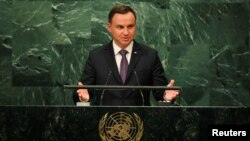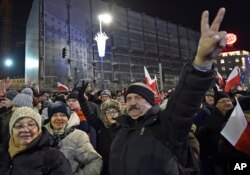Nearly 200 Polish human rights groups and non-governmental organizations urged President Andrzej Duda on Wednesday to veto a bill the country's Supreme Court and ombudsman said would violate Poles' constitutional right to freedom of assembly.
Lawmakers of Poland's right-wing ruling Law and Justice party (PiS) removed late on Tuesday some restrictions on free assembly from the bill, part of a wave of legislation the government says aims to strengthen traditional Catholic and national values.
But the bill would still provide a legal basis for prioritizing rallies deemed by the authorities to have national importance — such as historical anniversaries — over other demonstrations and gatherings.
A government official would be given powers to ban any counter-demonstrations if they took place closer than 100 meters to a rally deemed to be of national importance.
Under current rules, local authorities give precedence to whichever organization files the first request to stage a rally or demonstration, irrespective of the aims of the gathering.
“We call on you, Mr. President, to veto this bill as it violates the Constitution of the Republic of Poland and international conventions ratified by Poland,” 194 rights groups and other organizations said in a petition filed to Duda.
Duda's spokesman said on Wednesday the president, a close ally of the government, wanted to ensure that the right to assemble freely remained as broad as possible in Poland.
“The president will analyze the bill with the greatest attention and will take his decision in due course,” spokesman Marek Magierowski said.
Government officials say the bill is necessary to ensure the safety of demonstrations.
But Poland's Supreme Court has said the bill as a whole is an attempt to undermine the constitutional order. An earlier version of the bill gave specific privileges to rallies organized by the state and the church, but those privileges were later removed.
The Council of Europe rights group has said the bill would disproportionately restrict the right to freedom of assembly, in disregard of the European Convention on Human Rights.
The nationalist-minded, eurosceptic PiS passed laws earlier this year that made it more difficult for the constitutional court to pass rulings, a move that led the European Commission to say democracy and rule of law were threatened in Poland.
Commission Vice President Frans Timmermans said on Wednesday he was deeply concerned about Poland's new laws on the constitutional tribunal.






